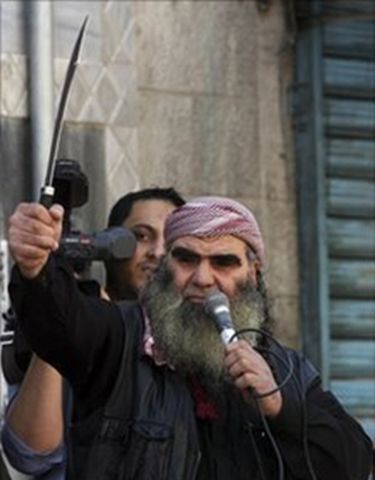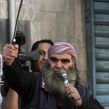
Jordan’s New Generation of Salafi-Jihadists Take to the Streets to Demand Rule by Shari’a
Publication: Terrorism Monitor Volume: 9 Issue: 18
By:

Jordan has not escaped the political turmoil and street confrontations that have enveloped the Middle East during the so-called “Arab Spring.” The on-going debate between the Jordanian government and protestors seeking political reform in Jordan escalated on March 24 when one man died and scores of others were injured in clashes that erupted between pro-government and pro-reform protesters at the Interior Ministry Circle in Amman. The pro-reform protestors claimed that security forces turned a blind eye to the attacks against them.
Prime Minister Marouf Bakhit blamed the Muslim Brotherhood for the violent developments (Jordan Times, March, 25). In an interview with Jordanian television, Bakhit accused the group of creating chaos in the country and taking orders from Islamist leaders in Egypt and Syria, while warning them “not to play with fire” (Petra News [Ammon], March, 27).
Jihadists on the Street
Some Jordanian Islamists have joined street protests for the first time in their history. These include the Salafi-Jihadists, whose members have held demonstrations in several cities of Jordan demanding the release of their imprisoned colleagues while stressing that their movement has paid a high price for Jordan’s alliance with United States in the so-called “War on Terror.” The jihadists, who demanded that Jordan be ruled by Shari’a, have shown that they are large in number, organized and defiant. The jihadists hailed the recent release of four of their colleagues and cancelled a pre-planned demonstration in Amman a few days later, adding that “the State [of Jordan] knows our strength” (al-Jazeera.net, April 12).
On April 15, Salafi-Jihadists were among other Jordanian groups demonstrating after Friday prayer in various Jordanian cities. After demonstrating in Amman, Ma’an, Salt, and Irbid, jihadists then went into the streets of Zarqa, the hometown of Abu Mus’ab al-Zarqawi, the late leader of al-Qaeda in Iraq who was killed in June 2006.
The protest ended with clashes between jihadists and pro-government and security forces that resulted in some 80 injured policemen. Jordan’s police chief, Lieutenant General Hussein Majali, stated that eight civilians had been hurt when police fired tear gas to stop Salafist demonstrators from attacking shoppers in Zarqa: "It was clear that the demonstrators had plans to clash with police. They carried swords and daggers and were provocative, seeking to drag police into a bloody confrontation" (AFP, April 15). Jordanian security services responded to the violence by conducting a series of raids in Zarqa and the nearby town of Rassifeh that rounded up some 70 Islamists, including prominent leader Shaykh Abdul Shahatah al-Tahawi (AFP, April 16).
Shaykh Ali Hasan al-Halabi, a prominent Salafist whose movement has a strong enmity towards the Salafi-Jihadists, claimed the violence was the work of those who falsely represent themselves as Salafis and are “known for their ugly takfiri thought” (Ammon News, April 16). However, Salafi-Jihadist leader Abu Obaidah complained that the Salafist movement had fallen “into a trap orchestrated by security forces to drag Salafis into events not planned for by the Salafis themselves” (Ammon News, April 28). General Majali warned that “those who deserve it” could expect much rougher treatment from the security services next time (Ammon News, April 16).
According to their spokesperson, Dr. Sa’ad al-Hunaiti, the Salafists denied attacking policemen, saying they were defending themselves while blaming the government for sending “thugs” to confront the demonstrators, similar to earlier clashes in Amman on March 24 (Ammon News, April 15). Elsewhere, al-Hunaiti has said the Salafist movement’s intention to implement Shari’a throughout Jordan threatens “Allah’s enemies” who are coordinating with the Jews and sending Jordanian Muslims to “fight as mercenaries alongside the Jews and Crusaders in Afghanistan,” a reference to Jordanian troops serving with Coalition forces (Al-Sabil [Amman], April 8).
In the wake of the violence in Zarqa, the state security court charged 146 Islamists on April 24 with plotting terrorist attacks (The National [Abu Dhabi], April 25; Jordan Times, April 26).
Structural Crisis
Like other Arab countries, Jordan has witnessed protests in the last three months calling for political and economic reforms as well as the elimination of corruption. Though the reform movement in Jordan has been inspired by the popular movements in Tunisia and Egypt, it is largely a response to a local grievances and changes in the Jordanian socio-economic structure.
The median age in Jordan is only 21.8. A high percentage of young people have an advanced education, creating a gap between the elites and the youth. This has combined with three important factors in creating a social disruption in Jordan:
• The increasing role of the private sector in the national economy reflects the sudden decrease in the role of the welfare state, which helped create jobs for youth, particularly in marginal areas of Jordan. In this context it is worth noting that the first demonstration protesting economic issues and demanding the resignation of then Prime Minister Samir Rifai’s was in the marginal small town of Dhiban (southwest Amman) on January 7 (UPI, January, 8).
• The increasing frustration caused by corruption.
• Jordan has witnessed a decline in freedoms, reflected in some of the slogans raised by the political parties and forces that took part in demonstrations in Jordan against the intervention of the Mukhabarat (secret service) in public life.
These factors played a major role in the development of what might be described as a “reform movement” which reflects the changes in Jordanian society. Jordanian journalist Musa Barhoomah, who is closely following the protests in Jordan, told Jamestown that the protests in Jordan represent a socially mobile movement; liberals, leftists, Islamists, youth movements, students, teachers and professionals are all involved in this movement. [1] Barhoomah is a member of the National Dialogue Committee formed after the protests started in Jordan as an umbrella for “political debates over reform,” though the Muslim Brotherhood refused to join the committee. The journalist told Jamestown that political parties, including Islamists, are not leading this social movement, but they are part of it and support it with their experience. This was confirmed to the author by Hamza Mansour, secretary general of the Islamic Action Front (IAF – the political arm of the Muslim Brotherhood), who explained the Brothers are not dominating the reform movement in Jordan: “We are partners of all believers in real reform… and we are an influential power in Jordan.” [2]
The IAF, established by the Muslim Brotherhood in 1992, is the largest opposition party in Jordan. It took part in the 1993 elections and won 17 of 80 seats. The party then boycotted the 1997 elections to protest the new election law known as “One Man, One Vote,” which replaced the old electoral legislation that allowed voters to cast ballots for several candidates in each constituency. The party again took part in the 2003 elections, the first since King Abdullah II succeeded his father, and won 17 of 110 seats. Remarkably, the IAF lost 11 seats in the 2007 parliamentary elections, a poll the Islamists considered fraudulent. The current Prime Minister was in office at that time, explaining the movement’s opposition to his re-election. The IAF boycotted the 2010 elections.
The highs and lows in IAF political participation reflect the relationship between the Jordanian regime and the Muslim Brotherhood since the latter’s establishment in 1946. Although it was always considered an opposition group, the Broterhood has never confronted the regime. Sometimes the Brotherhood was a strong ally to the regime, confronting the Palestinian factions that aimed to overthrow King Hussein’s regime for instance, or aiding the efforts to contain communism in the 1960s and 1970s.
According to some observers, the Jordanian government would not have violent jihadists in the streets of Zarqa if it had not “excluded moderate Islamists” from the political process and “dealt wisely and foresightedly with the Muslim Brotherhood, which has always been an incubator for stability and a foundation to contain radicalism, as well as [being] able to protect everyone from religious extremism” (al-Quds al-Arabi, April 17).
Conclusion
It is worth noting that most of the jihadists in Jordan represent a new and radical generation of the Salafi-Jihadist movement that consider themselves the inheritors of al-Zarqawi’s legacy. This new generation has been involved in an increasing number of jihad-related prosecutions after 2003. At the same time, developments in Jordan have shown there is a new leadership among jihadists that prefers a more public role, indicating a tacit admission that non-violent activism is more productive than violence in terms of political change, as seen in Tunisia and Egypt. This marks a shift in the thinking of some jihadists and could be a source of division in the movement. Moreover, this means that there could be jihadists who are now willing to talk to Arab regimes.
The Jordanian government’s response to the structural problems the country is facing will determine the future behaviour of Jordan’s Islamists, including the jihadists. Allowing demonstrations for all movements in Jordan will make the Brotherhood a prominent, but not dominant, part of the socio-political reform movement in Jordan. Furthermore, a prompt response to challenges such as corruption and freedoms would help in reconciling moderate Islamists and involving them in political life. Such a scenario would defuse violent tendencies among jihadists by outlawing rhetoric that legitimizes political violence.
On the other hand, if the government chooses to keep channels of communication blocked with the Muslim Brotherhood and increases security pressure on the jihadists, it will exacerbate the political tensions caused by political deadlock. Such a situation will provide fertile ground for jihadists to resort to violence.
Notes:
1. Telephone interview with Jordanian journalist Musa Bahooomah, March 29, 2011.
2. Telephone interview with Hamza Mansour, Secretary General of the Islamist Action Front (IAF), March 31, 2011.





